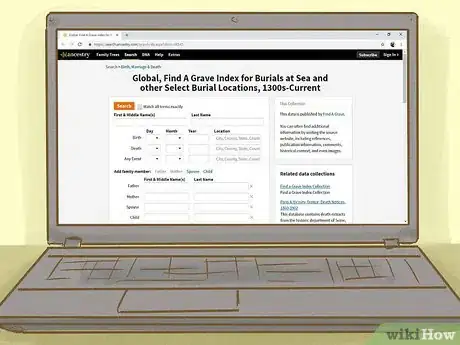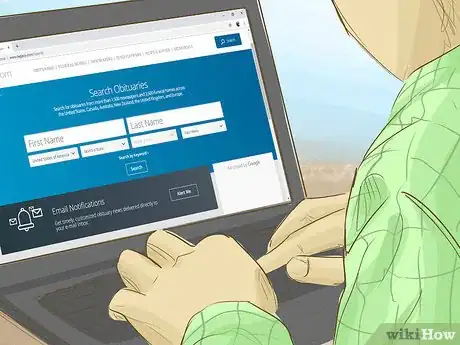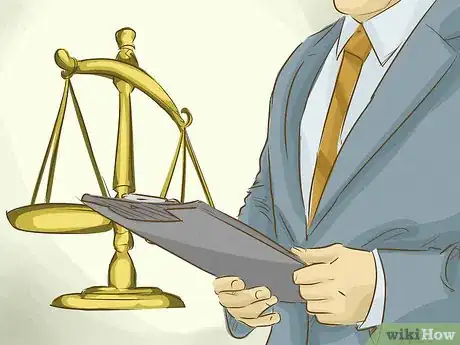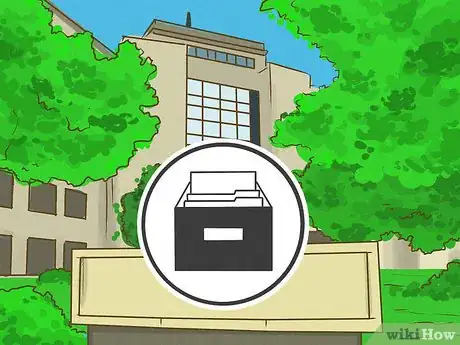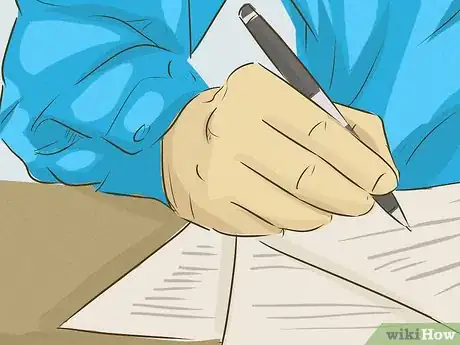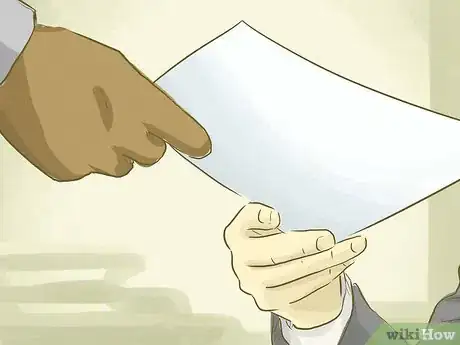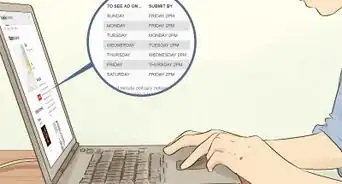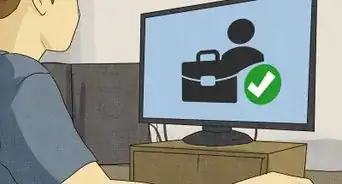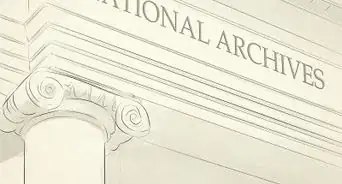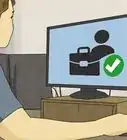This article was co-authored by wikiHow staff writer, Jennifer Mueller, JD. Jennifer Mueller is a wikiHow Content Creator. She specializes in reviewing, fact-checking, and evaluating wikiHow's content to ensure thoroughness and accuracy. Jennifer holds a JD from Indiana University Maurer School of Law in 2006.
There are 8 references cited in this article, which can be found at the bottom of the page.
This article has been viewed 145,911 times.
Learn more...
When faced with the death of a loved one, it can be difficult to find closure if you're unsure exactly when they died. You might also have trouble tracking down information if you're doing genealogy work and need to find missing information for an ancestor who died a long time ago, or in a remote area. Fortunately, there is a wealth of information on the internet that may be able to help you find the date you need.
Steps
Conducting an Online Search
-
1Start with a general search of the person's name. If you search the person's full name online, you may pull up newspaper obituaries or other information about them that will lead you to a date of death. This type of search typically yields better results if the person has a somewhat unusual name.[1]
- Even if the person has a relatively common name, you can filter out less relevant results by including other information about the person. For example, if you know the town where they were born, you can add that town name. An obituary typically would list where the person was born.
- If you know the names of other people who were related to that person or survived that person, adding those names can also help you narrow your search results.
-
2Try genealogy sites for older deaths. If you're trying to find out when someone died who lived hundreds of years ago, genealogy sites may be your best bet. Many of these sites have compiled data and records going back hundreds of years.[2]
- For example, ancestry.com has a global grave index available at https://search.ancestry.com/search/db.aspx?dbid=60541. This database indexes cemetery and burial details going back to the 1300s.
- You'll get better search results if you have a lot of information about the person. Otherwise, be prepared to sift through numerous results.
Did You Know? Most genealogy sites require you to buy a subscription to access many of their databases. However, public libraries or historical societies often have an account you can use to research free of charge.
Advertisement -
3Check online government databases. Many governments provide at least limited access to digitized government databases online. Do an online search for "death index" or "death records" with the name of the country the person was from.[3]
- If you believe the person died more recently, or at least within the past 50 years, government databases may have a record of the death.
- Older records may be spotty, especially if the country has been involved in war or civil strife, or had a significant change in government. For example, it may be more difficult to find out when someone died if they lived in Eastern Europe in the early 1900s.
-
4Search newspaper obituaries. Local newspapers typically publish an obituary whenever there is a death. For many people, this may be the only record of their death that is available. If you can find the person's obituary, you can find out when they died.[4]
- Go to http://www.legacy.com/search to search obituaries and funeral home notices published in Australia, Canada, Europe, New Zealand, the UK, and the US.
Researching in Person
-
1Talk to family members of the deceased. Family members may have records or keepsakes related to the deceased person. These can help you determine roughly when the person died, even if you can't get an exact date.[5]
- Older family members can be especially helpful if you're trying to track down when an ancestor or distant relative died.
- Prepare questions for the person before you meet with them and take care not to overwhelm them – especially if they are elderly.
- If you have any photographs, documents, or other artifacts related to the deceased, bring them along to help jog the person's memory or direct their focus.
Tip: If the older generations kept a family Bible, it may include a wealth of information regarding the deaths of ancestors.
-
2Search probate records at the local courthouse. If you know where the person died, the local courthouse may have records related to their death. A probate court record would exist if the person had a will, or if they died without a will but had property that needed to be distributed to surviving family.[6]
- Some courts have their records digitized and available online, but most do not. If the person died many years ago, you'll likely have to make a trip to the courthouse to find any court filings related to their death.
- If you can't easily travel to the area, call the clerk's office and let them know what you're looking for. They may be able to do a search for you and mail you the results.
- You'll typically have to pay a fee for a search of court records, as well as for copies of any records that are found. This fee is usually minimal (along the lines of a few US dollars).
-
3Visit a state or national archives facility. Most countries have archives with vital records and other historical information. The public typically has access to these records, although you may have to make an appointment or register as a researcher first.[7]
- Some records may also be digitized and available on the national archives website.
- National archives facilities are more likely to have records of someone who died during wartime or while serving in the military.
Locating Official Death Certificates
-
1Contact your country's embassy for foreign deaths. If the person was a citizen of your country but died in another country, your country's embassy in that country will have information about their death. Typically, embassy staff can get you a copy of the person's death certificate.[8]
- If the death was recent, the nearest embassy or consular office will also have the person's personal effects. These items are normally released to the person's next of kin.
-
2Check with the vital records office where the person died. In smaller countries, vital records and statistics may be kept at the national level. However, in most places, death certificates are kept at a more local level of government.[9]
- For example, in the US, you can find death certificates at either the state or county level. Older records are typically kept at the county level.
- Find out the process for getting a copy of the death certificate before you go through the trouble of ordering one. For example, some offices may require you to pick up the copy in person. If that isn't an option for you, there's no point in submitting a request.
-
3Complete a request form to get a copy of the death certificate. The vital records office will have a form you must fill out to request a copy of the death certificate. You typically have to provide information about yourself, the deceased, and the reason you want a copy of the death certificate.[10]
- Access to death certificates is restricted in some places. Restrictions are more common with more recent deaths.
- Some offices may require you to have your request form notarized. Look for a block on the form for a notary's seal. If notarization is required, don't sign your form until you are in front of a notary so they can verify your identity and your signature.
-
4Submit your form with any required fees. The request form has information on how to submit the form and what fees are required for copies of death certificates. If you need a certified death certificate, the fees will generally be more. However, you don't necessarily need a certified death certificate just to find out when the person died.[11]
- Some offices may allow you to submit the form online. However, if the form needs to be notarized, you will need to mail it or take it to the office in person.
-
5Receive your copy of the death certificate. After your request is processed, the office will mail you a copy of the death certificate. The death certificate will show the date the person died along with other information about their death.[12]
- If you're able to go to the office in person to submit your request form, you may be able to receive a copy of the death certificate immediately. However, if it's an older death, the records may be kept in archives off-site. Retrieval of an older death certificate may take a little longer.
Tip: Death certificates can include sensitive information, and may be redacted to protect the privacy of the deceased. However, the date of death is typically not redacted.
Community Q&A
-
QuestionAre death records public record?
 Drew Hawkins1Community AnswerDeath records, along with birth certificates, marriage licenses, and divorce decrees, are considered vital records and are created by local authorities. That means that they may not be public record if the local authority did not release them. However, deaths are often posted in newspaper obituaries, which you can search for online.
Drew Hawkins1Community AnswerDeath records, along with birth certificates, marriage licenses, and divorce decrees, are considered vital records and are created by local authorities. That means that they may not be public record if the local authority did not release them. However, deaths are often posted in newspaper obituaries, which you can search for online. -
QuestionCan you view death records online?
 Drew Hawkins1Community AnswerYou may be able to find death records for a specific person online. Try starting with a general search of the person's name to see if you can find any information about their death. For older deaths, try using genealogy sites such as Ancestry.com to find the records. If the person was from another country, you may be able to track down their death records from online government databases.
Drew Hawkins1Community AnswerYou may be able to find death records for a specific person online. Try starting with a general search of the person's name to see if you can find any information about their death. For older deaths, try using genealogy sites such as Ancestry.com to find the records. If the person was from another country, you may be able to track down their death records from online government databases. -
QuestionHow do I find a death certificate?
 Drew Hawkins1Community AnswerThe best way to find a death certificate is to contact the vital records office where the person died. If it was in the US, contact the office in the county where they died. In other countries, you may need to contact the national government for a copy of the death certificate. Once you track down where the death certificate is, you'll need to complete and submit a request form for a copy of it.
Drew Hawkins1Community AnswerThe best way to find a death certificate is to contact the vital records office where the person died. If it was in the US, contact the office in the county where they died. In other countries, you may need to contact the national government for a copy of the death certificate. Once you track down where the death certificate is, you'll need to complete and submit a request form for a copy of it.
Warnings
- Be respectful when contacting family members to inquire about a deceased person, particularly if the death was fairly recent. Don't keep hounding someone who refuses to talk to you or ignores your calls or messages.⧼thumbs_response⧽
References
- ↑ https://www.cnet.com/how-to/5-tips-for-finding-anything-about-anyone-online/
- ↑ https://search.ancestry.com/search/db.aspx?dbid=60541
- ↑ https://blog.findmypast.com/9-places-to-find-information-about-your-ancestors-death-2009688001.html
- ↑ http://www.legacy.com/search
- ↑ https://www.nypl.org/blog/2015/01/07/conducting-interviews-genealogical-research
- ↑ https://blog.findmypast.com/9-places-to-find-information-about-your-ancestors-death-2009688001.html
- ↑ http://www.nationalarchives.gov.uk/help-with-your-research/research-guides/birth-marriage-death-sea-or-abroad/
- ↑ https://travel.state.gov/content/travel/en/international-travel/while-abroad/death-abroad1.html
- ↑ https://www.health.state.mn.us/people/vitalrecords/death.html
About This Article
An easy way to find out when someone died is by doing a general search of the person’s full name online to look for newspaper obituaries. If your loved one or ancestor has a relatively common name, try including extra information about them in your search that might filter out less relevant results. For instance, add the town they were born in since that’s usually included in an obituary. When adding keywords to your search, consider including the terms “death index” or “death records,” as these might point you toward digitized government databases. To learn about ancestors who lived hundreds of years ago, opt for genealogy sites rather than generic web searching. Ancestry.com, for example, has a global grave index that goes back to the 1300s. For more tips, including how to get a copy of a death certificate, scroll down.

